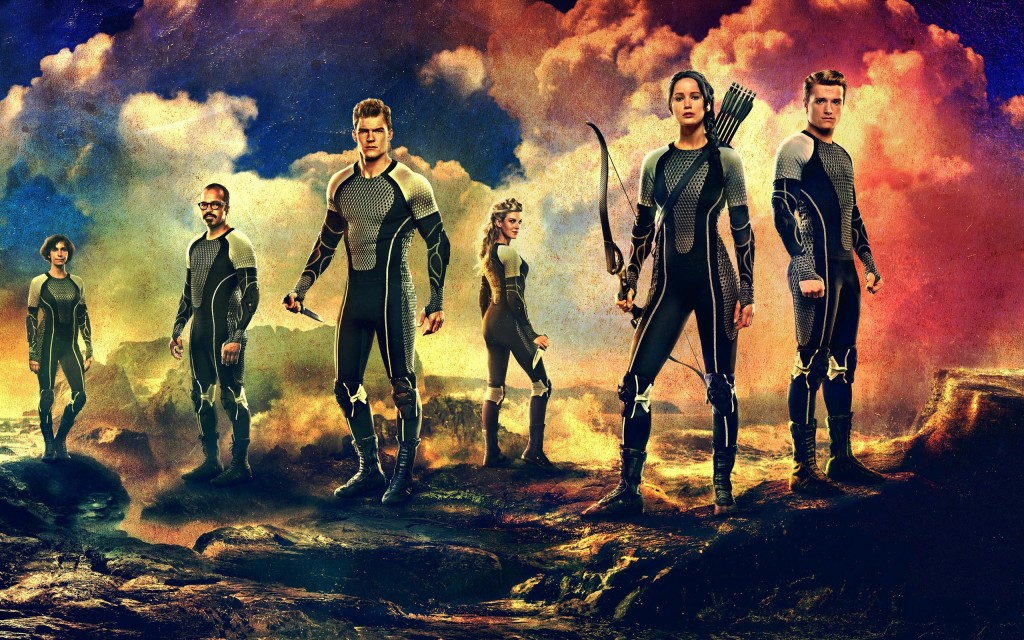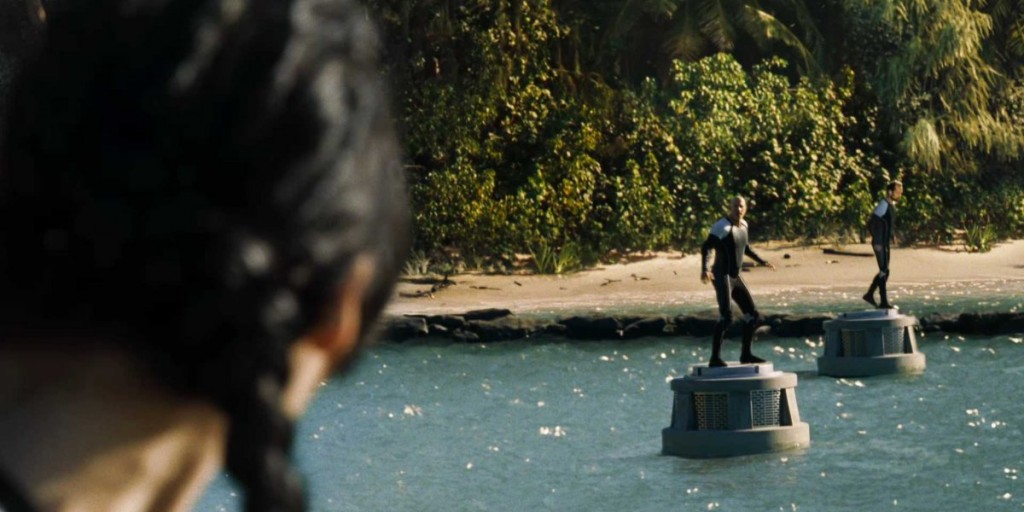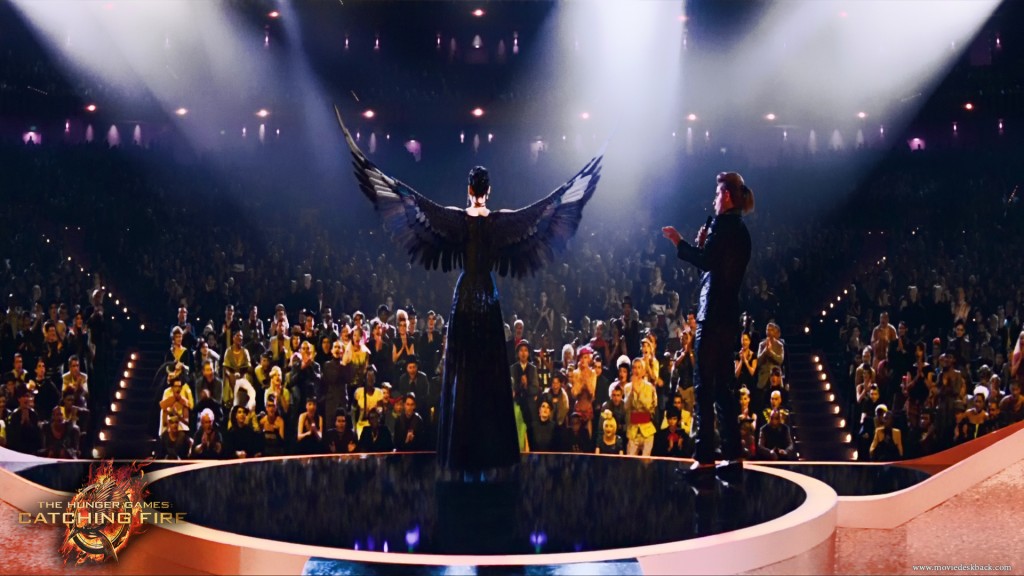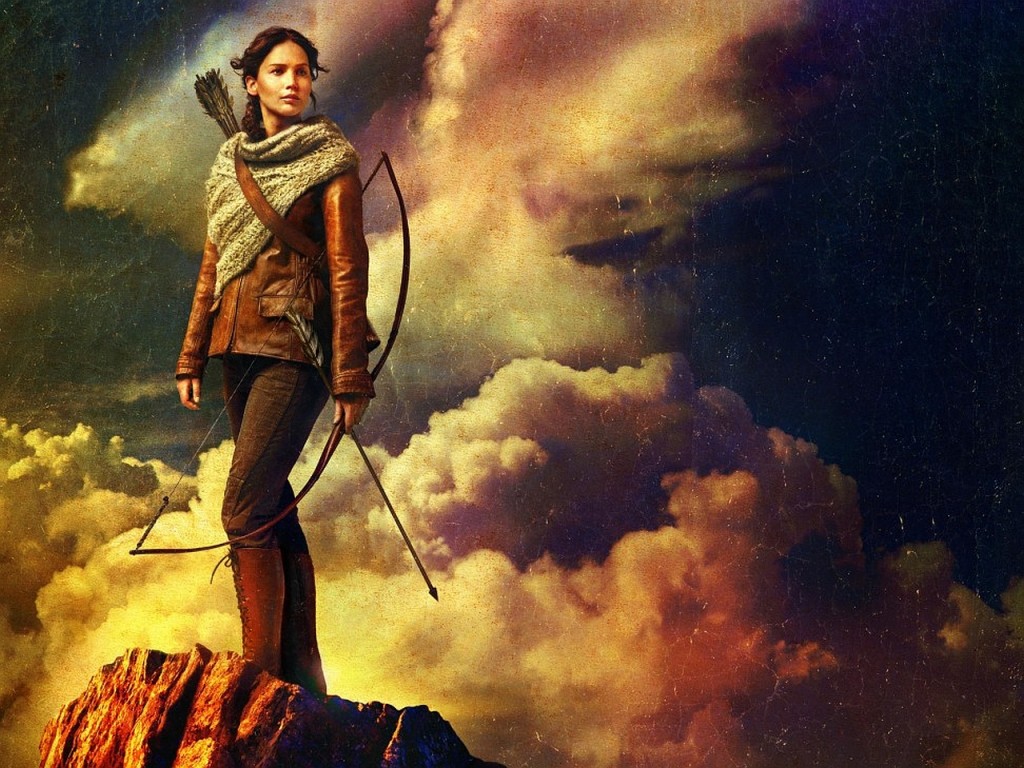 “He could have killed me, but instead he showed me mercy. That’s a debt I’ll never be able to repay.”
“He could have killed me, but instead he showed me mercy. That’s a debt I’ll never be able to repay.”
The Hunger Games trilogy is not the story of a hero. Katniss Everdeen mentions in the first act that Thresh’s act of kindness was one of several things that enabled her to win in the previous Hunger Games film. She is not even an intentional revolutionary trying to change the world. Catching Fire expands on this to demonstrate that heroism is all around her in the midst of her suffering, and she is being changed and shaped by it not just into the woman she’ll become, but the inspirational people others need.
Much like the classic sequel formula of The Empire Strikes Back and The Dark Knight, this second installment of the Hunger Games series appropriately expands the world, complicates the relationships, ups the stakes, and fully realizes what the first film laid foundationally. The directing, cinematography, and costuming are all superior to the original so on a purely aesthetic level it trumps the first one in nearly every way. We are also drawn into the intrigue as change is coming, from unexpected sources, and it becomes difficult to tell friend from foe. However, there is a critical moment when one character reveals:
“Katniss, you have been our mission from the beginning.”
Isn’t this what we hope and long for on our arduous days? This is one way in which the character of Katniss Everdeen captures the hearts of readers and viewers alike: there is a hope in us that someone, or a community, is rallying to our side to save us from calamity. On our worst days of anxiety where we may not be facing death by quarter quell but what seems like death by cubicle, or dysfunctional community, or in some cases real persecution… we hope that someone out there is truly looking out for us and on a mission to love, surround, protect, and deliver us. It’s a fantasy that touches on something some of us wish for, while others of us rest in a certainty that it is true even when every human stands against us.
“Remember who the real enemy is.”
Katniss also lashes out at those who try to help her. It’s difficult for her to trust, carrying bitterness and trauma from childhood and perhaps even realizing the limitations of her own subjective discernment. She could wind up being mistaken, so why trust anyone? This probably also sounds somewhat familiar, as some of us have been burned – or seen others wounded – by so-called friends. Catching Fire, however, clearly demonstrates that Katniss’ alternative isn’t effective: she can’t simply rely on herself. She has to trust in someone, and pray it’s the right someone, or her life is forfeit. Whereas our lives may not feel as imminently in danger as Katniss Everdeen, is this not a reality we face in this life… and if this life is like a round of the Hunger Games, what reality do we face when it’s over? It all depends in whom we put our trust.
“So it’s you and a syringe against the Capitol? See, this is why no one lets you make the plans.”
The story of Katniss is not the story of a strong, capable woman as some naively suggest; it’s the story of a strong, capable woman being built by perseverance, trial and suffering. She may be street smart, and great with her bow, but we see again and again that she lacks wisdom. She lacks patience. Katniss doesn’t understand playing the long game. And to be fair, she’s young. These are traditionally not things we are born with, and the Hunger Games series chronicles her arduous ascent. So… what is it about these stories that we enjoy? Our protagonist is lacking, doesn’t even intend to be society’s savior… and yet:
“For consider your calling, brothers: not many of you were wise according to worldly standards, not many were powerful, not many were of noble birth. But God chose what is foolish in the world to shame the wise; God chose what is weak in the world to shame the strong; God chose what is low and despised in the world, even things that are not, to bring to nothing things that are, so that no human being might boast…” – 1 Corinthians 1:26-28
Instead of mighty Hercules, or Perseus, or Gilgamesh, the story of biblical “heroes” often stand out in stark contrast: surprisingly small people who aren’t demi-gods but come from humble origins. They are often people who doubt, or run from responsibility, or chafe at their role, or fail spectacularly because of pride or vice. From Moses to David, Noah to Jonah, Gideon to Jeremiah, we don’t see supermen championing the cause of righteousness and standing singularly as agents of change. We see people whose arms are supported by others, people who are rebuked by their true friends, people lifted up those around them and put in place to achieve a mission that’s far larger than their singular story. The world is changed, and they are positioned to be a pivotal part, and they are changed as much as the world by the time it’s all over.
Katniss is not of noble birth, she demonstrates repeated foolishness and fallibility, and despite some amazing gifts is ultimately weak… but she is used to shame the strong, champion the low and despised, and isn’t even fully in on the plan. She can’t boast in herself, but we cheer her on because its encouraging to think that change could happen in, around, and through us in similar fashion… often despite ourselves.
“From now on, your job is to be a distraction so people forget what the real problems are.”
I hope people aren’t wholly distracted by the plight, and deliverance, of Katniss Everdeen in Catching Fire… if we miss the point of why this story truly tugs are our heartstrings, her role becomes distraction as if we were simply like the garish people who populate the Capitol. If we are titillated by the mere idea of Katniss, but don’t consider its correspondence to our REAL problems, our REAL condition, we’ve just medicated ourselves with a movie much like the Hunger Games were meant to mitigate true revolution. Are we truly catching fire, or simply playing with it?
Katniss Everdeen: “What can you see?”
Primrose Everdeen: “Hope.”
What if someone who could easily have killed you – utterly destroyed you – offered you mercy instead? What if they gave you that chance? And what if there was even an intentional mission to save us? Suzanne Collins crafted a fiction wherein this unlikely scenario offers a future to Katniss Everdeen, wherein she plays a part to seek and save others. What if, in the arena of our lives, that same someone who gave us mercy did so with love and intention… and could then utilize us, despite all our failings and shortsightedness, to be part of a grander mission that truly changes the world? The story conveyed by a guy named Jesus 2,000 years ago is that this unlikely scenario bears itself out in reality… an eternal deliverance from the arena we presently populate.
And the debt we could never repay? He paid it for us.





